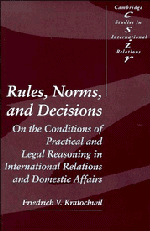 Rules, Norms, and Decisions
Rules, Norms, and Decisions Book contents
- Frontmatter
- Contents
- Acknowledgements
- Introduction: The resort to norms
- 1 Rules, norms, and actions: laying the conceptual foundations
- 2 Anarchy and the state of nature: the issue of regimes in international relations
- 3 The emergence and types of norms
- 4 The force of prescriptions: Hume, Hobbes, Durkheim, and Freud on compliance with norms
- 5 The discourse on grievances: Pufendorf and the “laws of nature” as constitutive principles for the discursive settlement of disputes
- 6 The notion of “right”
- 7 The question of “law”
- 8 The path of legal arguments
- Conclusion: The international legal order, international systems, and the comparative analysis of the practice of states
- Notes
- Index
8 - The path of legal arguments
Published online by Cambridge University Press: 01 June 2011
- Frontmatter
- Contents
- Acknowledgements
- Introduction: The resort to norms
- 1 Rules, norms, and actions: laying the conceptual foundations
- 2 Anarchy and the state of nature: the issue of regimes in international relations
- 3 The emergence and types of norms
- 4 The force of prescriptions: Hume, Hobbes, Durkheim, and Freud on compliance with norms
- 5 The discourse on grievances: Pufendorf and the “laws of nature” as constitutive principles for the discursive settlement of disputes
- 6 The notion of “right”
- 7 The question of “law”
- 8 The path of legal arguments
- Conclusion: The international legal order, international systems, and the comparative analysis of the practice of states
- Notes
- Index
Summary
According to the requirements of most, if not all legal systems, a judgment not only has to contain at a minimum the “decision” reached but has also to provide reasons in support of the particular choice made by the judges. Similarly, Article 56(1) of the I.C.J. statute stipulates that a statement of the “reasons on which the judgment is based” is necessary. Furthermore, in accordance with the ideals of formal justice and the separation of powers doctrine, judges are “bound” in their decisions by the “law,” or as the German Basic Law elaborates, by Recht und Gesetz. Similarly, the I.C.J. statute provides in Article 36 a list of primary and subsidiary “sources” of law by which the Court is directed in its search for applicable rules and norms.
Precisely because judicial decisions have to be based on certain relevant features of the factual setting, but also have to invoke general norms, the argument has been made that judicial reasoning is best understood in terms of the standard logical procedures of deduction (or induction). As persuasive as these arguments appear, there are several problems with such comparisons. First, in spite of the tendencies of some courts (particularly in the French legal system) to make their decision resemble deductively derived conclusions, legal reasoning differs in significant respects from the logical entailments familiar from traditional logic.
- Type
- Chapter
- Information
- Rules, Norms, and DecisionsOn the Conditions of Practical and Legal Reasoning in International Relations and Domestic Affairs, pp. 212 - 248Publisher: Cambridge University PressPrint publication year: 1989
